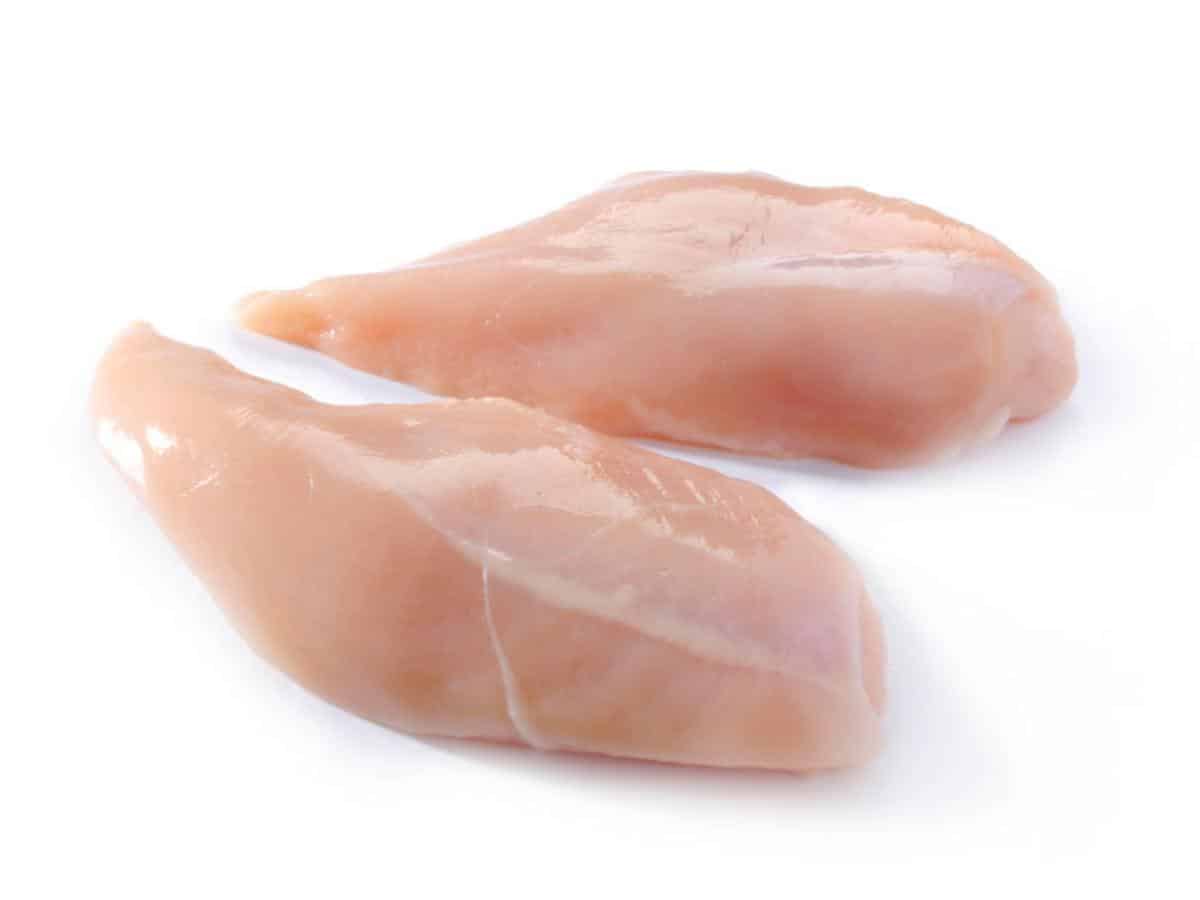How Much Protein Is In 8 OZ Of Chicken Breast? All You Should Know.
8 oz of chicken breast protein: Chicken breasts are one of the most widely consumed foods, particularly among bodybuilders and those trying to lose weight. This is because chicken breasts are a wonderful source of lean protein and are beneficial when following a diet plan to lose weight and build muscle.
POEPLE ALSO READ; Bcaa Vs Protein
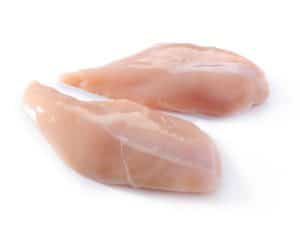
Additionally, those who include chicken breasts in their daily diet obtain a healthy metabolism and increase muscle mass. Also, chicken breasts are affordable and easily found in any grocery store. Therefore, it does not put a strain on a family’s shopping budget.
This is always a part of elite athletes’ meals because of its nutrition, which is high in protein and low in carbohydrates. On the other hand, 8 oz of chicken breasts are typically available in restaurants and are likewise quite simple to prepare.
Knowing how much nutrition will be on your plate is preferable if you plan to include chicken breast in your diet. The typical chicken breast purchase, if we’re talking about it, is an 8 oz of chicken. A professional athlete consumes it every day, although this would last one person on a balanced diet for a week.
The numerous cuts of chicken include drumsticks, thighs, wings, and breasts. Each stake has a unique nutritional value, calorie content, and texture. In this article, we’ll provide you with all the necessary information you need to include 8 oz of chicken breast in your diet.
PROTEIN IN 8 OZ OF CHICKEN BREAST.
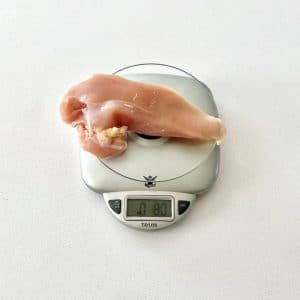
There are 56–61 grams of protein in an 8 oz of chicken breast. The amount of protein varies depending on the chicken’s quality, which includes the thickness of the skin.
Approximately 50 grams of protein make up an 8 oz of chicken breast. The 8 ounces of the fried or baked chicken breast include around 70 grams of protein after cooking.
However, when purchasing raw or uncooked chicken breast at the grocery store, be sure to read the nutritional information for an exact protein count. The product information is precisely stated, down to the quantity of the product in a chicken breast.
Because every chicken has a variable skin thickness, the protein content differs between brands and products. Your chicken breast will have more calories the more skin it has.
8 oz of chicken breast includes 8% of total calories from protein. Fats make up the remaining 20% of the calories. A chicken breast weighing 8 ounces has 2.78 grams of total fat but no carbohydrates.
Is 8 Oz Of Chicken Breast Enough In Terms Of Protein?
Everybody’s needs for protein in the body vary, but on average, adult men need around 56 grams daily, while adult women need about 46 grams (71 grams, if pregnant or breastfeeding). Let’s first look at how much protein your body needs each day before we answer the question of whether 8 oz of chicken breast will suffice.
People need 0.36 grams of protein per pound of body weight (0.8 grams per kilogram) each day, following a study by The Dietary Reference Intake [DRI].
The minimum amount of protein needed each day, for a person weighing 165 pounds [75 kilograms], is 60 grams.
Although this is the least quantity of protein intake necessary to prevent protein deficit, other variables including fitness level, age, muscle mass, body weight, height, and general health can be obstacles.
Additionally, if you are in the muscle-building phase, more protein is needed by your body to mend the injured muscles and fibers.
56 grams of protein in 8 oz of chicken breasts are sufficient for a typical person who leads a sedentary lifestyle. Additionally, due to its high protein and low-calorie content, it is the ideal food for bodybuilders.
Factors That Affect The Protein Content Of Chicken Breasts
- Cooked versus raw
- In versus Out bone
- Skinned versus skinless
- Percentage Of Retained Water
8 Oz Of chicken protein (Raw)
The most prevalent type of chicken breast you’ll find in most supermarkets is the boneless, skinless variety. Athletes and bodybuilders use it because of the high protein-to-calorie ratio.
A nutrition database’s listings indicate that an 8 oz. raw, skinless chicken breast contains about 52 grams of protein. That equates to around 240 calories with only 3 grams of fat and no carbohydrates.
8 Oz Of Chicken Protein (Cooked)
A chicken breast loses around 25% of its weight while cooking. Thus, chicken that weighs 8 oz while raw will weigh just 6 oz after cooking.
In other words, compared to the raw chicken breast of the same weight, cooked chicken breast has approximately 25% more protein. A cooked 8 oz of chicken breast, therefore, contains about 70 grams of protein (52g*1.25).
After you prepare huge quantities of meat to divide up later for meals, it’s helpful to know how much protein chicken breast has when it’s cooked. But be aware that the amount of protein can change according to the manner, temperature, and time of cooking.
8 Oz Of Chicken Protein (Skin-On)
The presence of skin on the chicken breast should also be taken into consideration. The skin’s higher fat and lower protein content compared to the meat itself is the cause.
Several database entries state that an 8 oz of skin-on chicken breast contains about 42 grams of protein. Additionally, the skin-on breast has 380 calories and up to 24 grams of fat.
Of course, you may cut back on the fat and calories by draining the extra oil once the chicken has been cooked. However, a skin-covered chicken breast often has more fat than a skinless breast.
8 Oz Of Chicken Protein (Bone-In)
The bone is frequently still present when purchasing skinless chicken breasts. And the bone replaces the weight of an 8 oz of chicken breast in terms of meat.
The breastbone typically weighs about 4 oz. Therefore, there would only be about 4 ounces of meat in an 8 oz. bone-in chicken breast.
A bone-in, skin-on 8 oz of chicken breast, therefore, contains about 21 grams of protein.
Health Benefits Of Eating 8 Oz Of Chicken Breast
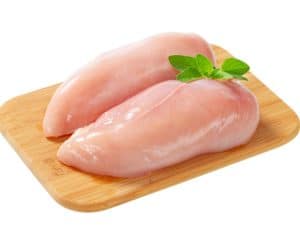
Your health may benefit from including chicken breast in your diet plan. Let’s analyze them.
Maintains And Increases Muscle Mass
Protein, which is abundant in chicken breast, is necessary to both create and maintain a person’s muscle mass. Studies reveal that a reduction in protein levels in the human body results in a marked reduction in the body’s muscle mass.
Lowers Appetite
Due to its low calorie and fat content but high protein content, chicken breast aids in reducing food cravings and preventing overfilling.
A 2016 study on overweight individuals found that those who consumed more protein had improved food appetites and lost more weight after following a low-calorie diet plan.
Strengthen Bones
According to studies, eating animal protein, such as chicken breast, boosts bone density in humans because the protein works with calcium to help protect bones. Protein and calcium are essential for maintaining the strength and health of the bones.
Anti-Depressant
Tryptophan amino acids are present in chicken breast and have the special ability to relax muscles. A study found that when someone eats chicken breast, serotonin levels in the brain rise, and the body’s tense muscles are loosened.
Therefore, most people feel satisfied after eating 8 oz of chicken breast because it is delicious and relieves muscle tension.
8 Oz of Chicken Breast Protein Replacement
If you’re just starting or become tired of including chicken breast in your diet. Despite the abundance of food options available, you must pick a perfect substitute that has about the same amount of protein as an 8 oz of chicken breast.
Plant-Based Chicken Breast Substitute
Edamame
Edamame beans are young, unripe soybeans that are collected before they become hard or mature. These are a great substitute for chicken breast because they are low in calories and have about 24. 5 grams of protein in an 8 oz of a chicken cup (226 grams).
Additionally, the abundance of antioxidants, amino acids, and fiber in this food will aid to control and lower blood cholesterol levels. Even though it is not quite as much protein as chicken breast, the amount of protein in plant-based foods is very substantial.
Seitan
Wheat gluten flour is used to make seitan, a vegan alternative to meat. While being minimal in calories, fat, and carbs, seitan is high in protein. It includes all nine necessary amino acids and 21 grams of protein in a 1/4-cup (28-gram) meal. This is the ideal substitute for an 8 oz of chicken breast protein due to its high protein content.
Tempeh
Due to its high protein content and vitamin and mineral content, the fermented soybean food known as tempeh makes a great alternative to chicken breast. A portion of tempeh weighing 8 ounces (226 grams) has 40 grams of protein and 24 grams of fat. In addition, there are 432 calories in 8 ounces of tempeh, more than there are in 8 oz of chicken breast (246 calories).
Tofu
Tofu is a popular food among bodybuilders because of its high protein content. It is made from condensed soy milk. There are about 38 grams of protein in 8 oz of tofu. In addition, just 350 calories and 23.5 grams of fat are contained in 8 ounces. Consequently, it is an excellent replacement for 8 oz of chicken breast protein.
How Many Calories Are In 8 Oz Of Chicken Breast?
Chicken breast weighing 8 ounces has 376 calories (boneless, skinless chicken breast).
The most popular cut of chicken is chicken breast, which is high in protein and low in fat, making it a suitable choice for those wanting to lose weight.
The following nutritional changes can be seen in a cooked, skinless, boneless chicken breast (172 grams):
- 284 calories
- 53.4 grams of protein
- 0 grams of carbohydrates
- 6.2 grams of fat
A serving of chicken breast weighing 3.5 ounces (100 grams) has 165 calories, 31 grams of protein, and 3.6 grams of fat.
This indicates that chicken breast contains 20% fat and 80% protein in terms of calories.
Remember that these quantities are for a chicken breast alone, without any additional ingredients. You add more calories, carbs, and fat when you cook something in oil or when you marinate or sauce it.
Chicken Skin Adds Calories To The 8 Oz Of Chicken Breast’s Calorie Count.
While 180 g of skinless chicken breast has roughly 300 calories, 80% protein, and 20% fat, these figures change significantly when the skin is included.
196 grams of cooked, skin-on, boneless chicken breast contain:
- 386 calories
- 58.4 grams of protein
- 15.2 grams of fat
A skinless chicken breast contains 50% protein and 50% fat in terms of calories. Additionally, eating the skin adds about 100 calories.
Similarly, a skinned chicken wing (34 grams) has 99 calories, while a skinless wing has 42 calories (21 grams). So, compared to a skinless wing’s 36% of calories, the calories in skinned chicken wings comprise 60% fat.
So, eat skinless chicken to reduce calories and fat if you’re watching your weight or intake of fat.
What Size Of Chicken Breast Is An 8 Oz?
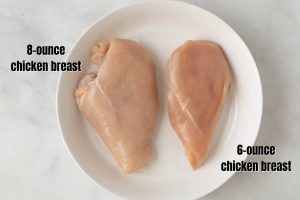
An uncooked, boneless chicken breast typically weighs 6 to 10 ounces. Accordingly, an 8 oz breast is approximately average, although it’s still a sizable portion of meat.
3 to 4 ounces is the recommended serving size for chicken breast. So an 8 oz amount is equivalent to two portions and is more significant than what most individuals eat in a single sitting.
A high-protein diet makes an 8 oz of chicken breast an easy meal for big bodybuilders or people with large appetites.
Conclusion
A high-protein diet makes an 8 oz of chicken breast an easy meal for big bodybuilders or people with large appetites, though.
Unquestionably, chicken breast is the best food high in protein. And it’s a mainstay in almost all meal plans for muscle gain or fat loss.
But how much protein exactly makes up an 8 oz of chicken breast on average? The type of chicken breast and the timing of the weigh-in will determine the answer.
